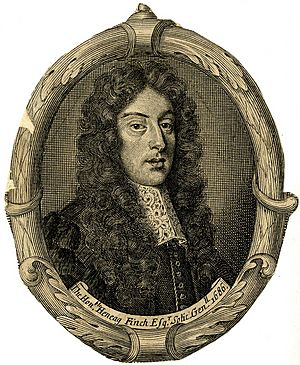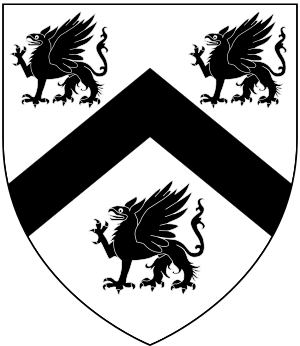Heneage Finch, 1st Earl of Aylesford facts for kids
Quick facts for kids
The Earl of Aylesford
|
|
|---|---|
 |
|
| Chancellor of the Duchy of Lancaster | |
| In office 6 November 1714 – 12 March 1716 |
|
| Monarch | George I |
| Preceded by | The Lord Berkeley of Stratton |
| Succeeded by | The Earl of Scarbrough |
| Member of Parliament for Oxford University | |
| In office 1701–1703 |
|
| Preceded by | Sir Christopher Musgrave, Bt Sir William Glynne, Bt |
| Succeeded by | William Bromley Sir William Whitelocke |
| In office 1689–1698 |
|
| Preceded by | Charles Perrot George Clarke |
| Succeeded by | Sir Christopher Musgrave, Bt Sir William Glynne, Bt |
| In office 1679–1679 |
|
| Preceded by | Laurence Hyde Thomas Thynne |
| Succeeded by | Sir Leoline Jenkins Charles Perrot |
| Member of Parliament for Guildford | |
| In office 1685–1689 |
|
| Preceded by | Richard Onslow Morgan Randyll |
| Succeeded by | Foot Onslow John Weston |
| Solicitor General | |
| In office 1679–1686 |
|
| Preceded by | Sir Francis Winnington |
| Succeeded by | Sir Thomas Powys |
| Personal details | |
| Born | 1649 |
| Died | 22 July 1719 (aged 69–70) |
| Political party | Tory |
| Spouses |
Elizabeth Banks
(m. 1678) |
| Parent | Heneage Finch, 1st Earl of Nottingham |
| Education | Westminster School |
| Alma mater | Christ Church, Oxford |
Heneage Finch, 1st Earl of Aylesford (born around 1649, died 22 July 1719) was an important English lawyer and statesman. He held several key positions in the government during his lifetime.
Contents
Who Was Heneage Finch?
Heneage Finch was a powerful figure in English law and politics during the late 1600s and early 1700s. He was known for his skills as a speaker and his strong beliefs. He served as a Member of Parliament and held high legal offices. Later, he became an Earl, a high rank in the British nobility.
His Early Life and Education
Heneage Finch was born around 1649. He was the second son of Heneage Finch, 1st Earl of Nottingham. His father was also a very important person in the government.
Heneage Finch went to Westminster School, a famous school in London. After that, he studied at Christ Church, Oxford, which is part of the University of Oxford. He started his studies there in 1664.
Becoming a Lawyer and Politician
In 1673, Heneage Finch became a barrister. This means he was a lawyer who could argue cases in court. A few years later, in 1677, he became a king's counsel. This was a special title given to experienced lawyers who advised the King.
In 1679, he was appointed Solicitor General. This is a senior legal role, helping the government with legal matters. At the same time, he became a Member of Parliament for Oxford University. Later, in 1685, he was elected to represent Guildford.
His Role in Government and Law
Heneage Finch was a Tory politician. This meant he supported the King and the Church of England. He was known for his strong opinions.
In 1686, King James II wanted to use a special power called the "dispensing power." This power would allow the King to ignore certain laws. Heneage Finch refused to support this. Because of his refusal, King James II removed him from his position.
Later, in 1688, he was a lawyer for the Seven Bishops. These bishops had refused to read a declaration from King James II. Finch argued against the King's power in this important case.
When King William III came to power, Finch did not hold any government jobs. He often disagreed with the new government's decisions. He believed that James II was still the rightful king.
Later Achievements
In 1703, Heneage Finch was given the title of Baron Guernsey. He also became a privy councillor. This meant he was a trusted advisor to the monarch.
After George I became King in 1714, Heneage Finch was given an even higher title. He became the Earl of Aylesford. He was also reappointed as a privy councillor. He then became the Chancellor of the Duchy of Lancaster, a senior government role. He held this position until 1716.
Heneage Finch was known as a great speaker. Many people thought he was one of the best orators in England. He was also seen as a very fair and honest lawyer.
Personal Life and Family
On 16 May 1678, Heneage Finch married Elizabeth Banks. She was the daughter of Sir John Banks.
Together, Heneage and Elizabeth had nine children:
- Lady Elizabeth Finch (1679–1757)
- Heneage Finch, 2nd Earl of Aylesford (1683–1757)
- Lady Anne Finch (died 1751)
- Hon. John Finch (died 1739/40)
- Lady Frances Finch (died 1759)
Heneage Finch died on 22 July 1719. His eldest son, also named Heneage, became the 2nd Earl of Aylesford. The title has been passed down through his family ever since. Many of his descendants have also been named Heneage.
 | Dorothy Vaughan |
 | Charles Henry Turner |
 | Hildrus Poindexter |
 | Henry Cecil McBay |


